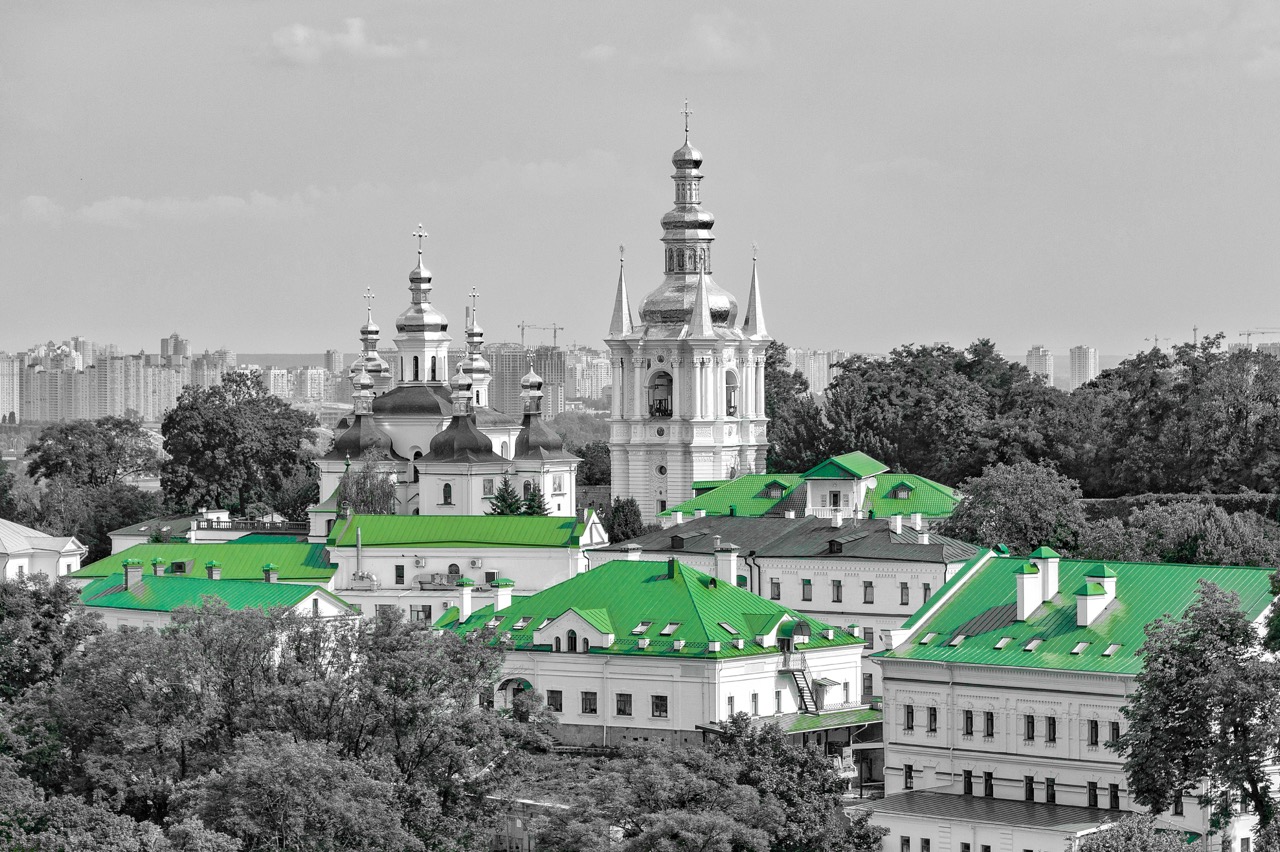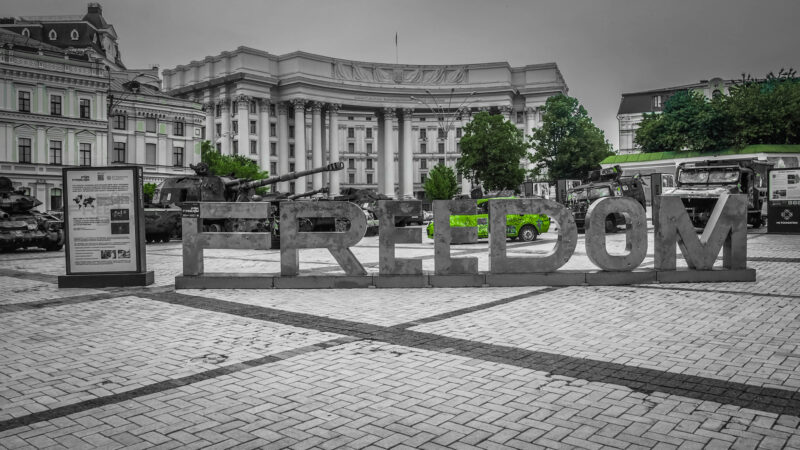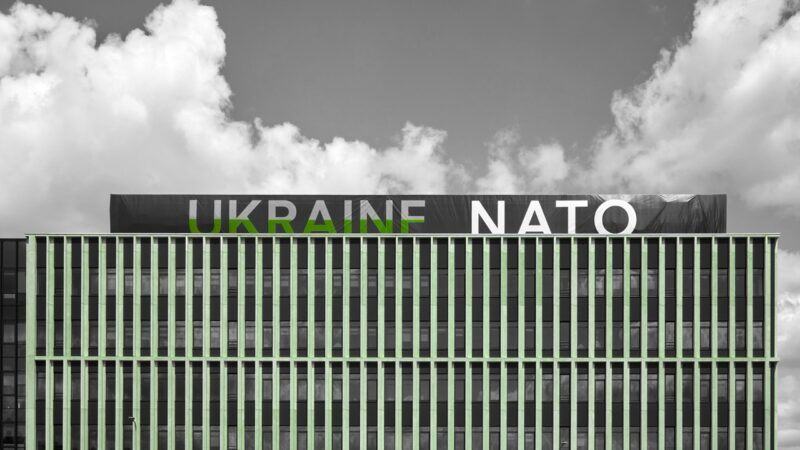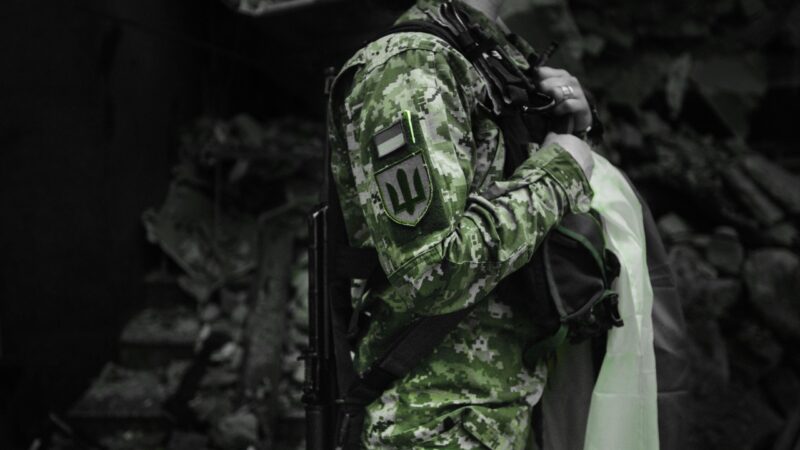Interview with Regina Elsner | Ukraine has a historical tradition of religious plurality and tolerance

Heather Coleman: Much has been said about the instrumentalization of religion, in particular Orthodox Christianity, by both sides in the Russo-Ukrainian war. How has war affected the relationship between church and state in each country?
Regina Elsner: I will start with Ukraine to answer this question because the situation is very different for each country and their respective societies and churches. In Ukraine prior to the full-scale invasion in 2022, President Poroshenko used the church and the topic of religion as part of his electoral campaign in 2018. This was something quite new for Ukraine. Until then religion had always played some role in politics, and all the presidents attempted to use the Orthodox churches in one way or another. Poroshenko was different in that he emphasized three key themes in his election campaign: army, language, and faith. In this way, he was playing very direct politics with religion and specifically Orthodoxy. The result of this political process was the establishment of the Orthodox Church of Ukraine as an independent church for Ukraine. However, Poroshenko’s re-election campaign failed, and we ended up with an interesting situation in 2019, in which Zelenskyi began his presidential term without any agenda for religious affairs whatsoever. He was really the first president of Ukraine who was not interested in making use of any religious community for his political strategies.
This situation presented a huge opportunity for the Orthodox churches to detach from politics and exist in a society where politics were not interested at all in using them. I thought then and still think that this was a good—although not normal or canonical—situation for the Orthodox churches in Ukraine. The conflict between them calmed down quite a bit in the years after this. Between 2019 and 2022 there was almost no political instrumentalization, allowing for the beginning of a healthy public discourse. There was a clear objective for the Orthodox churches to be in contact with and be a part of civil society in order to discuss topics relevant to society outside of politics. There was some conflict about the transfer of parishioners between the churches, and there were some attempts to politicize these questions, but they were not successful. This was a pretty good situation for an Orthodox Church in the post-Soviet space.
However, in 2022 the situation changed in Ukraine quite seriously, due to the full-scale invasion. Russia was already using Orthodoxy as a weapon in its propaganda war and continued to do so with the onset of the full-scale war. The Russian side appropriated the Ukrainian Orthodox Church by claiming that it had to defend it and attempting to convince the world that Ukraine has certain historical and religious links with Russia, and so on. The Russian side strategically weaponized the religious factor and those few remaining tensions in Ukraine, and this is why Ukraine also had to politically react. In 2022 we saw growing public and political pressure on the Ukrainian Orthodox Church, which was in communion with the Moscow Patriarchate. We also saw that the Orthodox Church of Ukraine—the independent church—used its national loyalty as symbolic capital and tried to become a part of politics in Ukraine.
Therefore, by the end of 2022, almost a year into full-scale war, religion had become a question of state security. On 1 December 2022, President Zelensky delivered a famous speech in which he discussed guaranteeing Ukraine’s spiritual independence and why, in order to safeguard this independence, the state must be involved with religious questions. Russia politicized religion in the context of the war, thereby provoking a response in kind from Ukraine. From my point of view, we now have a very complicated and ambivalent situation, in which Ukraine is trying to balance religious freedom on the one side and state security on the other. This is a new and also quite dangerous instrumentalization of religion for political aims, as religious freedom is a constitutive part of human security.
For Russia, the situation is different. For several decades we have observed the close Russian relationship between state and church. For over twenty years now, the Russian Orthodox Church (ROC) has been privileged as an instrument of the state. There are mutual benefits between state and church, which both sides extensively exploit. Since 2012, church and ruling elites have joined efforts to transform society into a repressive system—from autocratic rule to a totalitarian state, which we now have. The church and state cooperate on every level from the security sector to domestic politics, culture, education, health care, the military and so on. The war, from my point of view, has amplified this closeness, which was already quite close. For example, for a long time the state refused to follow the church’s demand for legal restrictions on abortion rights. Now, amidst open war, the issue of demographics has become crucial and the state is limiting women’s access to abortion, justifying it through “traditional values.” We now see a relationship close to a kind of a merger, where it becomes very difficult to distinguish religion from politics. We see a mutual dependence on ideology, linking cultural and religious superiority, and an apocalyptic self-confidence where religion is one of the major weapons in war, although this is not a religious war. Religious narratives fuel the propaganda. The church is partly securing international support for the state via its ecumenical global networks, and domestic mobilization is filtered through religious and Orthodox ideas. In this way, the war has strengthened this church-state relationship to a degree that they are now really one in their politics of war.
Coleman: Most assessments of the role of religion in this war focus on the political aspect. What theological ideas within Orthodox Christianity either enable or restrain political instrumentalization for the purposes of war?
Elsner: This is very much a global question about the role of religion in conflicts. Peace and conflict studies show that religion is fundamentally ambivalent in conflict; every religion is capable of supporting violent or nonviolent solutions—no world religion is violent per se—and Orthodoxy is no exclusion. However, there are factors that impact which side the Orthodox churches find themselves on in a concrete situation. On the one hand, there is the general Christian message of peace, which we have in all Christian churches and which is one of the main ideas in our biblical and religious traditions. Peace is in the center of Orthodox liturgy and individual spirituality, and reconciliation and love for the neighbour and the stranger are key ethical teachings. This, of course, can help contribute to nonviolent solutions, help communities cope with conflict and guilt, and facilitate paths to peaceful coexistence and reconciliation.
On the other side, there are certain Orthodox traditions that make Orthodox churches more susceptible to becoming a part of violent conflict. There are at least three main points. Firstly, Orthodox Christianity has very weak social ethics. The result is that peace and the responsibility for peace is a very individualized concept. The individual has to somehow find peace within themselves or with the people around them, but peace is not thought about as a social concept—as a social responsibility to create just and peaceful societal structures with the church as a part of them. Therefore, the responsibility for the solution of social or political conflicts, including the use of violence, rests completely with the state. Secondly, in contrast to other 21st-century Christian traditions, Orthodoxy still has a very strong relationship with the nation and the state. Surveys show that Orthodox populations are more supportive of national ideas—as, for example, ideas of cultural superiority. This generates a particular understanding of the Other as an enemy or a threat. Loyalty toward the state exceeds loyalty toward society. Accordingly, the church might be loyal to the state even in a situation where the state uses its power with violent means against its own people, if it is provided some kind of legitimate rationalization. The third factor is that Orthodoxy—in contrast to other contemporary Christian traditions—is the only church that strongly emphasizes exclusive truth. Being Orthodox means being the only one having true faith. From this perspective, there is a lot of potential to exclude, to see matters in binary terms, and to have quite a conflicted relationship with the world around you. This can easily turn into violence in a broader sense, especially when combined with a certain apocalyptic mindset.
These three aspects do not make Orthodoxy a violent religion, but especially the lack of a critical theological approach to questions of structural violence and conflict strengthen the potential to be more on the side of conflict and become instrumentalized for the purpose of war. The option to go into opposition to defend peace in a situation when the state says we now have to fight for whatever reason, is almost nonexistent. The Orthodox churches tend to support the state and its decisions, because of this obligation to state loyalty. If the state defends us—i.e., the church, our values, or our civilization—then we must support the state in return. The national idea, which is part of the concept of autocephaly, also makes it very easy to become part of nationalistic movements and adopt a dualistic way of thinking. Social ethics that would try to prevent this process or at least question it with a theological approach to diversity, freedom and justice—as seen, for example, in Catholic social teachings—could significantly change these paradigms.
Coleman: On the eve of the full-scale Russian invasion, you argued that the polarization between the Orthodox Church of Ukraine and the Ukrainian Orthodox Church can only be overcome by serious inter-confessional dialogue on social ethics. Can you elaborate on that idea? Do you think there’s now any hope for such dialogue?
Elsner: This is related to what I previously mentioned about the situation in Ukraine before the full-scale invasion. We had a really unique situation for a country with several Orthodox churches. For about 30 years, two rather large Orthodox churches in a majority Orthodox country participated in public discourse about Orthodoxy’s societal role. In this regard, the Revolution of Dignity had already made an impact, and the situation from 2019 to 2022 was an inspiring and hopeful time, from my point of view. You could really see how the Ukrainian churches were engaging with a modern and mature civil society. They attempted to understand their role in an environment where the state was learning to allow civil society to independently find their own solutions to social debates.
Both Orthodox churches in Ukraine had to rely on themselves alone and on their emerging social ideas. We saw that they tried to engage with questions about social life. There were discussions about a just society, and there was work done on peace ethics and about the role of religious communities in a fragmented society that is struggling with questions of history and reconciliation. The debate about Europe and being a part of Europe became a topic where the church tried to find positions and discuss it also with the other religious communities in Ukraine. There was this kind of fruitful contestation of ideas about a common Ukrainian future and the churches’ part in that. We could see, at this point in time, that if the process went a little farther, the churches would have started to have a real theological dialogue about social topics. The Orthodox churches have no difference in teachings; there is no contestation about dogmatics: they have the same faith, they have the same traditions, and so on. This is not the issue—the issue is how to live in a society without the protection of a strong state that takes one religious community and says, “you are the right one, and you contribute to our political agenda, so let’s work together.”
Another important aspect—possibly unique in the post-Soviet context—is the Ukrainian tradition of religious tolerance and plurality that extends to other communities. The Greek Catholic Church is a huge factor in this, because they introduce Western ideas of social teaching and being part of civil society as separate from the political system. The various churches in Ukraine have collaborated and defined this dialogue on multi-religious platforms. It was a huge opportunity to overcome the polarization of the two Orthodox churches, where the question of canonicity was linked to political conflict, and to embrace constructive diversity as a value from which everyone benefits. I believe that the outcome of this process would have been Ukraine as the first majority Orthodox country with peaceful coexistence between several Orthodox churches actively participating in a diverse public discourse—or not, if they did not see it as part of their vocation. We know from the example of Western societies that we can have different Catholic and Protestant currents in society; people are free to choose. It is not a conflict about truth but rather a question of which ideas you prefer in society, and you are free to find your spiritual home. This would be a very precious situation, for Orthodoxy to overcome its nationalization and the idea that borders cannot accommodate two churches and their respective ideas in one society.
Of course, the war made this extremely difficult and maybe even impossible, because war polarizes to the extreme. Russia’s war has accelerated the polarization between the churches in Ukraine and their political and social ideas. However, there are promising initiatives of dialogue that we can see at the moment. There are priests and parishioners who try to overcome this polarization, who understand that as Orthodox believers of Ukraine they have to somehow find unity in this situation. What is interesting to me is that these dialogue initiatives are all built on ideas of social ethics. They start with the idea that there is a Christian responsibility for our common home, for our common society. It is the idea of the first ecumenical initiatives in the 20th century: we have to be united in all our differences, work toward reconciling society and making it resilient amidst war—not weakening it through splits. These are very ethical ideas, which believers and priests at the grassroots level really care about. The fact that these initiatives start from such social ideas confirms my belief that these are the grounds on which the churches can meet and talk together about their joint ideas and traditions of being a part of society. I think that this is the only chance for Ukrainian Orthodoxy to overcome the polarization. However, on the one hand, Russia makes it very hard to move along this path, and propaganda destroys the mutual trust you need for such movements. And on the other hand, the hierarchical structure of both Orthodox churches in Ukraine makes it very difficult, as the leadership of both churches is not necessarily or fully supportive of these initiatives. Strong centralization and the idea of obedience makes it very difficult to have such a free dialogue and debate between the churches. Nevertheless, I can see no other way forward than this in a quite impossible situation between the trenches.
Coleman: What has been the impact of the war on the long-standing dialogue between the global Roman Catholic Church and the Orthodox churches and on ecumenical relations more generally?
Elsner: This is a very difficult situation at the moment. From one perspective, we see that we have a long-standing dialogue between the Roman Catholic Church and the Orthodox Church as one. However, we don’t have the one Orthodox Church envisaged in this concept at the moment, we cannot speak about a united Orthodox Church. The global Orthodox Church is deeply fragmented at the moment and it is paralyzed by their fragmentation. It is unable to convene a council or a synaxis to find a common position or language in this disastrous situation, where one of the Orthodox churches justifies a war of annihilation of another Orthodox country. So the first question would be, whom we are talking about when talking about the ecumenical dialogue?
The official dialogue between the Roman Catholic Church and the Orthodox Church continues. They had their last large meeting in 2023, in Alexandria, Egypt. However, not all churches attended it, just like the 2016 Pan-Orthodox Council in Crete and other ecumenical meetings. This means that the results of the dialogue are not very sustainable—churches will (and did) refuse to accept or implement consular decisions, because they were absent. The joint commission in Alexandria approved a document titled “Synodality and Primacy in the Second Millennium and Today,” but the very topic of synodality is highly questionable in this situation. It has no correlation to the reality and the praxis of the churches and thus appears as wishful thinking. There is no synodal decision-making in Orthodoxy at the moment, as there is, unfortunately, no serious dialogue between the Orthodox churches. Approving consensual ecumenical documents in the current situation can be seen as a simulation of dialogue in times of ecumenical speechlessness.
The problem of ecumenical dialogue in this war is that we have lost a common language to have a really credible and sustainable dialogue about what is going on. It is revealing that this dialogue continues but on topics which are not related to the war. The war itself is not a topic of theological dialogue. This is a huge problem, because this war does have an ecumenical and a theological dimension. The ideology of war coming from the Moscow Patriarchate is fueled by Christian concepts and traditions, which is a problem for all Christian churches. The ideology behind this war—its messianism, apocalyptic thinking, anti-liberalism, cultural imperialism, and so on—would be a topic for serious theological dialogue on both the bilateral and the global level. Dialogues with Rome, and also with the World Council of Churches, could continue to maintain some level of communication and not burn bridges, but it is obviously impossible to find a common position today on these very pressing questions.
The third factor in this question of ecumenical dialogue is that the Roman Catholic Church is highly ambivalent in its relationship with Russia, the Russian Orthodox Church, and Russian culture. While condemning war in general, the Holy See continues to give Russia and the ROC the credit of having been provoked, not properly understood, culturally superior, etc. The Vatican shares with the ROC a general suspicion of democracy, liberal values, and individual rights. There is a significant historical and substantial imbalance in the Vatican’s relations with Russia and the ROC on the one hand, and Ukraine and the Ukrainian churches on the other. The Vatican seems disinterested in strengthening dialogue with and knowledge about the Ukrainian churches. It seems like the Roman Catholic Church is not able to accept that Russia’s war is a deliberate war of annihilation against Ukraine, that it is evil in a deep and theologically meaningful way, and that this has a really serious impact on ecumenical relations. How can you continue talking about ecclesiology, the common calendar for Easter, or the “language of Jesus” when your ecumenical partner justifies mass atrocities? The ROC used the ecumenical relations with Rome for its own benefit and undermined ecumenical trust long before 2022. However, the war now makes it really impossible to speak about dialogue with the ROC on any kind of a substantial, significant level. And a similar dialogue of the Ukrainian churches with Rome is tragically still missing.
Coleman: What role can religious groups play in reconciliation in Ukrainian society after the war?
Elsner: Given the complicated role religion plays in this war, I am hesitant to expect too much. There is a paradigm in peace and conflict studies that says religion cannot be part of the solution when it is such a huge part of the problem and even one of the reasons for war. In such a case, first and foremost religions need to assess their own complicity in the war, their participation in the conflict’s dynamics, and ideological underpinnings.
Nevertheless, the biggest potential for religious communities to be a part of reconciliation in Ukrainian society after the war is thanks to Ukraine’s historical tradition of religious plurality and tolerance. So far, this tradition has not been destroyed by the war. It is a bit hard right now to work amidst the polarization, but this experience is still very strong in the arguments of the Ukrainian Council of Churches and in all the statements of the Orthodox churches and other churches in Ukraine. They always return to the experience of Ukraine as a country and society with a history of religious tolerance, and this is a treasure that will be invaluable for future reconciliation.
We also see that religious communities play a huge part in humanitarian assistance in Ukraine. They are present where the people suffer. The churches are there, they have not left, and the priests are on the grassroots level. The churches are some of the most reliable and credible actors in humanitarian and spiritual support for the people. It is very important for potential future reconciliation that people experience the church as a reliable partner in the struggle for life and for dignity, that they understand priests are trustworthy and authentic persons, and that the churches offer safe spaces for all people, even if they have different political views. The fact that the churches are present where people suffer speaks to the prospect that they will be valuable contributors to reconciliation exactly on this grassroots level. In contrast, I do not believe the churches’ role at the institutional or leadership level has much chance to contribute positively as long as there is no honest engagement with the conflicts, hate speech, and Othering that they have fostered during the war. These actions have caused harm to a large part of the Orthodox population.
The biggest challenge for a constructive role of the churches in social reconciliation is a theological one. No religious community in Ukraine—Orthodox or otherwise—has a substantial tradition or praxis of collective repentance and metanoia. I really think that in a situation where religion plays such a key role as a tool of warfare, for any chance of postwar social reconciliation process there is a need to acknowledge and process your own complicity and guilt in this war. The responsibility of a church for failures and destructive developments is much more than individual responsibility, it is a question of structural injustice and violence, and of institutional responsibility. In Christianity we have a huge potential to deal with guilt, but the church has very much put responsibility for repentance and metanoia on the individual and not on the church as a collective entity. I think if the churches find a way to make use of this Christian potential, of this theological idea of repentance and of metanoia for the churches, then they can contribute a huge part to social reconciliation after the war and make an example of what it means to overcome a wounded past, collective trauma, and the legacies of abusive power. We see this in German history quite well, how important it was that the churches acknowledged they were part of the war and the violence, and then to take the next step, not to teach others from a position of infallibility but to say “yes, we were a part of this, and let’s move on together.” In this case, churches can make a credible contribution.




